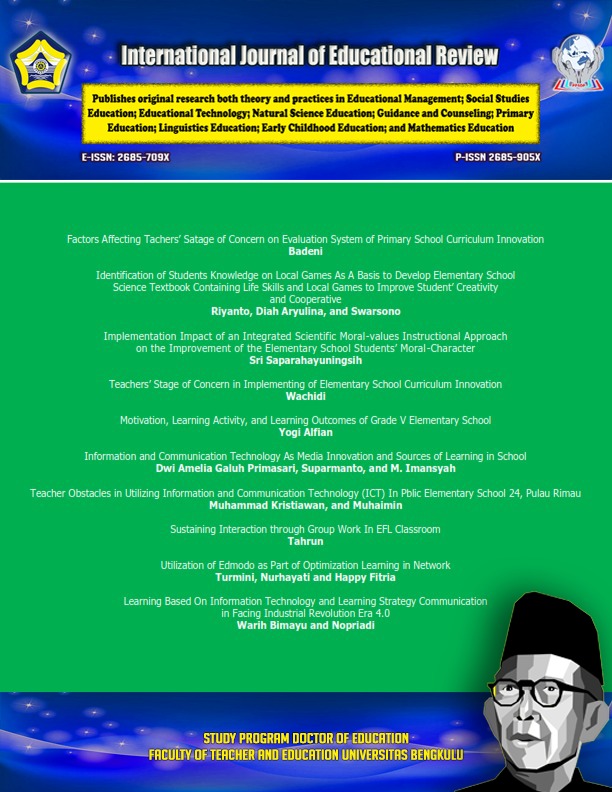Teachers’ Stage of Concern in Implementing of Elementary School Curriculum Innovation
DOI:
https://doi.org/10.33369/ijer.v1i2.8843Keywords:
Concern, Awareness, Curriculum Innovation, Stage of ConcernAbstract
The purpose of this study was to describe of teacher’ stages of concern in applicating curriculum innovation. The approach used in this study was a descriptive study. The number of population of this study were 500 primary school teachers. Meanwhile, the research sample were 50 teachers. A random sampling technique in the form of the lottery was used to get samples. Data were collected, classified, processed and analyzed by using the norms of the group in the calculation of percentile. The findings of this study were 42 % of teachers in a stage of concern called at the stage of awareness, 0 % of teachers have a stage of concern at the stage of I stage of information; 18 % of teachers have a stage of concern at the stage of personnel;10 % of teachers have a stage of concern at the stage of management); 16 % of teachers have a stage of concern at the stage of consequence; 6 % of teachers have a stage of concern at the stage of collaboration; and 12 % of teachers have a stage of concern at the stage of refocusing. The overall respondents have an average score of 2.06 (two point zero six). This means that their stage of concern for the implementation of the curriculum innovation is still low. They experience uncertainty in making decisions to adopt it. It was caused by (a) the lack of understanding of primary school teachers on information received, (b) lack of examples and evidence of the benefits of accepted curriculum innovation in school practices, (c) lack of training by trainers in applying new curriculum, (d) so complex in evaluating and (e) the curriculum is continuously changing.References
Departemen Pendidikan Nasional. 2012. Hasil Penelitian Balitbang Dikbud. Jakarta: Departemen Pendidikan Dasar dan Menengah. (t.p.)
Hall, G. E., & Hord, S. (2011). Applicating change: Patterns, principles, and potholes. Boston, MA: Allyn and Bacon.
Hall, G. E., & Hord, S. M. (1987). Change in schools: Facilitating the process. Albany, NY: State University of New York Press.
Hall, G., & Hord, S. (2011). Applicating change: Patterns, principles, and potholes. Boston, MA: Allyn and Bacon.
Harian Nasional. (2014). Kurikulum Diterapkan Bertahap. Jakarta: 14 Desember 2014: 12.
Issac, Stephen & Michael, William, B. (1982). Handbook in Research and Evaluation. California: Edits Publisher.
Miller, G.W. John P., and Seller, Wayne. (1985). Curriculum Perspectives and Practice. New York & London: Longman.
Rogers, E.M. (2003). Diffusion of innovations (5th ed.). New York: Free Press.
Seemann, K. (2003). Basic principles in holistic technology education. Journal of Technology Education, 14(2), 28-39.
Sprague, D., Kopfman, K., & Dorsey, S. (1999). Faculty development in the integration of technology in teacher education courses. Journal of Computing in Teacher Education, 14(2), 24-28.
Spotts, T.H. (1999). Discriminating factors in faculty use of instructional technology in higher education. Educational Technology & Society, 2(4), 92-9
Downloads
Published
How to Cite
Issue
Section
License

This work is licensed under a Creative Commons Attribution-ShareAlike 4.0 International License.




